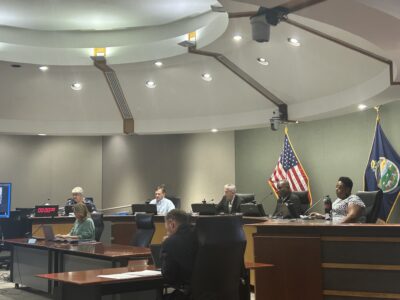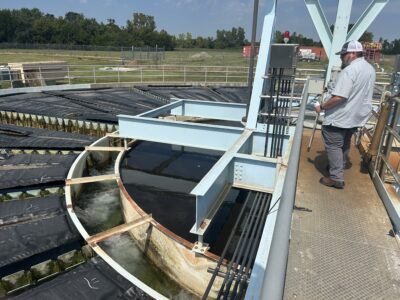Lawrence commissioners vote to adopt 2026 budget featuring slight property tax increase
The budget reduces cuts to public safety implements fees for city's rec centers

photo by: Bremen Keasey
Lawrence city commissioners voted Tuesday night to adopt the 2026 budget for the city. It includes a property tax increase to mitigate cuts to public safety positions while adding in membership fees for the city's Parks, Recreation and Culture's recreation centers.
Lawrence commissioners voted to adopt a 2026 budget for next year that will feature an increase to property taxes to reduce cuts to public safety while adding new fees to the city’s parks and recreation centers.
The commission voted 4-1 on the 2026 budget that will total $431 million across all its funds and include a mill levy rate of 33.674 mills — a 0.488 mill increase from the rate initially proposed in July. Commissioner Lisa Larsen was the lone no vote.
As the Journal-World has reported, discussions about the budget have gone on since January, in part because of a need to close a $6.5 million budget hole. Ahead of Tuesday night’s meeting, city staff provided the commissioners with three budget scenarios as a baseline ahead of the final vote: keeping the property tax rate flat, increasing the property tax rate slightly to offset some budget cuts; or putting the property tax rate at the maximum of 33.986 mills that the commission previously set.
The commissioners selected the second option presented by Alley Porter, a budget analyst for the city. The budget included the property tax increase that helps cover a “laundry list” of items that commissioners requested from the city during a public hearing about the budget earlier in the month.
Under the adopted budget, the city restored one position to Lawrence-Douglas County Fire Medical that would have been cut and added back two positions for the Lawrence Police Department.
Several firefighters spoke during public comment, noting while this budget will add the additional position, Seamus Albritton, the president of the union that represents Lawrence firefighters, noted that all three of the budget options would still mean one firetruck would be shut down to fully staff a different, larger truck.
By opting for the second budget scenario, the City Commission also approved a proposal that would create a membership program for residents to access the Parks, Recreation and Culture department’s rec centers. As the Journal-World reported, the initial membership proposal presented in July included membership fees for the city’s rec centers of $25 a month or $250 a year for individual adult residents; $15 a month or $150 a year for residents ages 5 to 17 years old and ages 60 and older; and $40 a month or $400 a year for a family membership.
The commission requested to cut those rates in half, so fees for Lawrence residents would be $12 a month or $120 a year for adults, $8 a month or $80 a year for seniors, and $20 a month or $200 a year for families; fees for nonresidents would be higher. Additionally, the commission asked that the rec centers allow free entry for Lawrence youth under 18 and for lower-income residents. Under this budget proposal, the city added $50,000 for the PRC department to offset the projected revenue from the higher fees. Luis Ruiz, the PRC director, told commissioners they will have the membership plan in place starting Jan. 2, 2026.
Several people asked the commissioners to reconsider the membership plan. Carol Kummer asked commissioners to reconsider this proposal, noting there has been a lot of public backlash to the fee proposal. She organized a petition against the fees which got just under 2,000 signatures, and she suggested with the fees in place many residents will consider joining other health clubs that have more amenities.
Other additions from the initial budget proposal included allocating $25,000 for small business support, $20,000 for neighborhood associations, and it would allocate $175,000 in the city’s Capital Improvement Plan for the Lawrence Farmers Market’s project to find a permanent location. Commissioner Amber Sellers specifically noted during discussion that she was proud of the commission for adding that in the city’s CIP.
Despite the additional options added in, the city will still be making large-scale cuts across its departments, with City Manager Craig Owens previously noting the cuts would be approximately 5% of the city’s general fund budget. One way that has been seen is in a reduction of the city’s headcount through a voluntary retirement program, which nearly 30 employees accepted as the Journal-World reported, and an internal hiring policy.
Just over a dozen public commenters shared their thoughts on the budget, with concerns on how the city could pay its debt, requesting additional public safety funding and urging against adding rec center fees.
Vice Mayor Brad Finkeldei addressed some of those concerns during his comments as he expressed his support for the budget. He noted the city reviews the CIP — which often includes debt funded projects — every year and has reserves with plans to pay off that debt.
Finkeldei also said that he supports adding the membership fees to rec centers, noting that while some residents use the centers heavily, others “never step foot in them.” Finkeldei feels that although they are supported in part through property taxes, it seems fair to him to have its users pay to use them — similar to the fees for the city’s aquatic centers — to reduce the overall burden.
“(I think) having fees strikes the right balance to keep property taxes down,” Finkeldei said.
Commissioner Lisa Larsen, the lone no vote, said that commissioners had asked to see a flat mill levy, and the initial proposal delivered that. She could have supported the first option, but said she could not support the others.
Mayor Mike Dever said he was excited to look toward the future now that the 2026 budget was approved. He said tonight’s vote was about figuring out “what (commissioners) got right and what we got wrong,” and it was important to have the city work through solutions over the shortfall the city faced.
Moving forward, Dever noted that planned projects — such as adding in a new fire station — will force potential tax increases in the future, and the city will need a concerted effort to add public input to make the right decision.
•
In other business, commissioners approved increases to the water and wastewater rates by 7.9% over the next three years.
Melinda Harger, an assistant director for the Municipal Services and Operations department, presented the plan for commissioners that would set those utility rates for 2026, 2027 and 2028 to increase by 7.9% year over year. The city projects those rates will generate an additional $5.7 million in 2026, $6.1 million in 2027 and $6.6 million in 2028.
The water and wastewater rates are typically set every three years. The last time the commission set those rates was in 2022, and the rates were increased by 8.75% in 2023 10.25% in 2024 and 11% in 2025, as the Journal-World reported.
Harger and Collin Drat, an analyst who helped create the proposed rate increase, said the increases were necessary in part for funding infrastructure projects for the city’s water and wastewater operations over the next three years. Harger noted the city plans to fund over $105 million in infrastructure projects, including improvements to the Kaw River Waste Water Treatment Plant and projects that can expand the capacity and growth of the system.
Additionally, Harger said that for the city’s new MSO campus, which is expected to have its construction finished in 2026, the wastewater and water fund will contribute around $23.6 million for the total of $64 million allocated for funding the construction costs next year.
The proposal to increase the water and wastewater utility rates comes at a time when other utility costs have increased. In July, the Kansas Corporation Commission approved an agreement with Black Hills Energy that increased residential natural gas rates by nearly $6 a month — or about 9%. Last year, the City Commission approved an increase to stormwater and solid waste rates by 7.5% and 4%, respectively — though the residential waste rate increase was smaller than the previous year. A couple of members of the public spoke about the concerns of the rate increases and the potential cost burden on Lawrence residents.
Mayor Mike Dever said that he felt the rate increases are consistent with other rate increases in the past, and this proposal is a “reasonable rate” considering the way the city hopes to expand its water system and provide high quality water for its residents.
The new rates go into effect Jan. 1, 2026.





